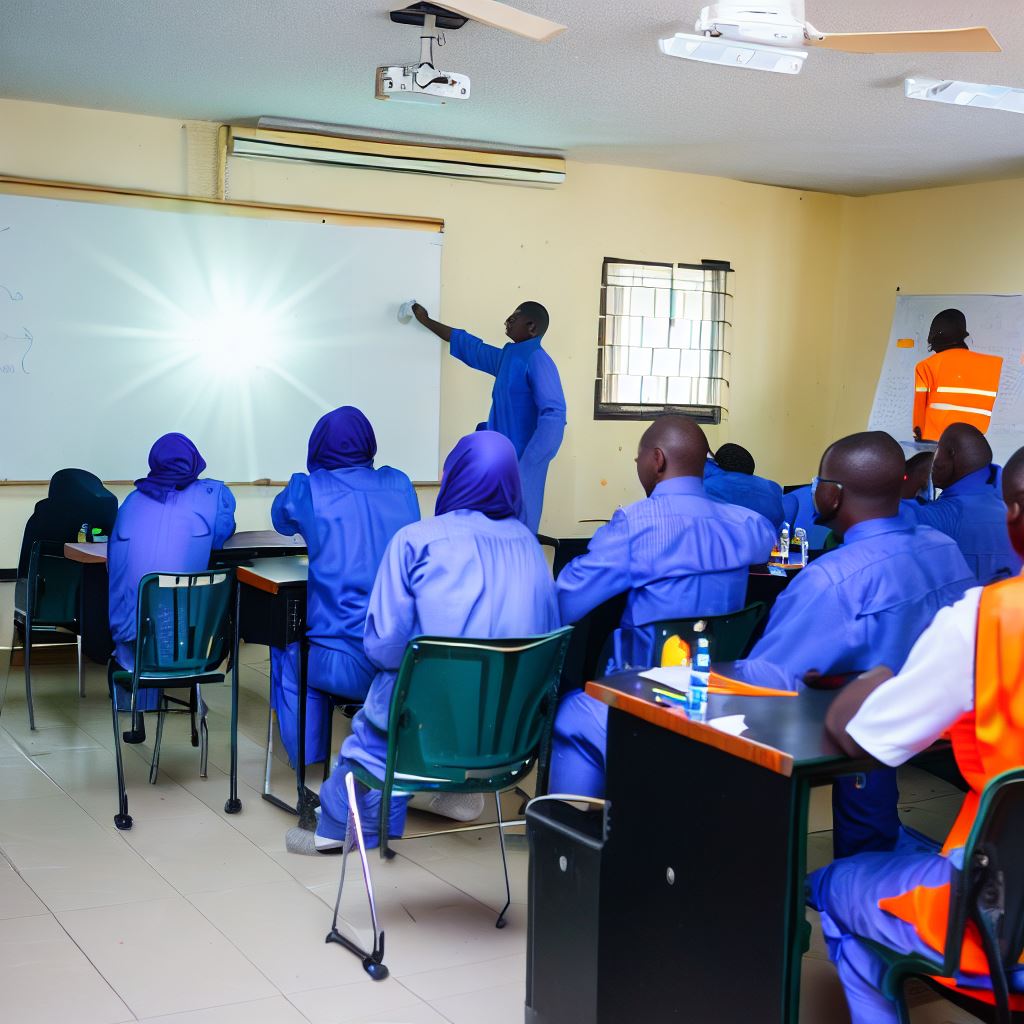Introduction
Let’s explore health & safety standards for janitors in Nigeria.
The pivotal role that janitors play in maintaining clean and orderly environments cannot be overstated.
In Nigeria, where diverse sectors rely on the meticulous efforts of these unsung heroes, it is imperative to establish and uphold robust health and safety standards.
This not only safeguards the well-being of the dedicated janitorial workforce but also ensures that the spaces they maintain are conducive to the health and productivity of all occupants.
In this discourse, we delve into the critical realm of health and safety standards tailored specifically for janitors in Nigeria.
This topic bears substantial significance, given the unique challenges and environments these professionals navigate daily.
From bustling urban centers to remote rural areas, the spectrum of settings that janitors encounter demands a nuanced approach to regulations and protocols.
This exploration will encompass an in-depth examination of existing regulations governing the janitorial sector in Nigeria.
It will also spotlight the array of challenges faced by janitors in adhering to these standards, shedding light on the disparities between policy and practical implementation.
Moreover, we will scrutinize potential solutions and strategies to fortify the health and safety infrastructure for janitors across the nation.
As we embark on this journey, it is imperative to recognize that the welfare of janitors directly correlates with the broader spectrum of public health and environmental sustainability.
By elevating the health and safety standards for janitors in Nigeria, we not only empower a vital workforce but also contribute to the overall well-being and prosperity of our communities.
Through informed policies, collective advocacy, and strategic initiatives, we pave the way towards a cleaner, safer, and more sustainable Nigeria for all.
Overview of Current Health and Safety Standards
In Nigeria, there are existing health and safety regulations that govern janitorial work to ensure the well-being of workers.
Nigerian laws and regulations applicable to the janitorial industry
These regulations are laid out in Nigerian laws and regulations applicable to the janitorial industry.
Here are some key guidelines and standards related to janitorial work:
- Occupational Safety and Health Act (OSHA): The OSHA is the primary legislation that governs health and safety in the workplace. It applies to all sectors, including janitorial services.
- Personal Protective Equipment (PPE): Janitors are required to use appropriate PPE, such as gloves, masks, and goggles, to protect themselves from hazardous chemicals, infectious materials, and physical hazards.
- Hazard Communication: Janitorial companies must provide comprehensive training on chemical hazards, proper handling, storage, and disposal of cleaning agents and substances, and the use of safety data sheets (SDS).
- Safe Work Practices: Employers are responsible for implementing safe work practices that minimize risks, such as proper lifting techniques, ergonomic considerations, and avoiding slips, trips, and falls.
- Fire Safety: Janitors should be trained on fire prevention, evacuation procedures, and the proper use of fire extinguishers. Fire exits and emergency exits should be clearly marked and easily accessible.
- Electrical Safety: Janitors working with electrical equipment must follow electrical safety guidelines to prevent electric shocks and other hazards. Regular equipment inspections and maintenance are necessary.
- Sanitation and Hygiene: Janitors should adhere to strict cleanliness and hygiene standards to prevent the spread of diseases. Proper waste management and disposal protocols should be in place.
- Work Hours and Rest Periods: Employers must adhere to labor laws regarding work hours, breaks, and rest periods to prevent fatigue-related accidents and promote the well-being of janitors.
- Mental and Emotional Health: Recognizing the impact of work stress on janitors, employers should provide support systems and resources, such as counseling services, to address mental and emotional well-being.
It is crucial for janitorial service providers and employers to familiarize themselves with these regulations and standards to create a safe and healthy work environment.
Regular training and monitoring should be conducted to ensure compliance and minimize workplace accidents and injuries.
Read: Regulations Impacting Janitorial Work in Nigeria
Common Hazards Faced by Janitors
Janitors play an important role in maintaining clean and safe environments in various establishments.
However, their work is not without risks. Understanding and addressing the hazards they face is essential in ensuring their health and safety.
Physical Hazards: Slips, Trips, and Falls
One of the most common hazards faced by janitors is the risk of slips, trips, and falls.
These accidents can result from wet or slippery floors, cluttered pathways, or uneven surfaces.
Preventive measures such as regular housekeeping, immediate spill clean-up, clear communication of potential hazards, and proper lighting are crucial in minimizing the occurrence of these accidents.
Exposure to Harmful Chemicals and Cleaning Agents
Janitors often work with various cleaning agents and chemicals that can be hazardous to their health if not handled properly.
These substances may include bleach, ammonia, disinfectants, and floor cleaners.
Proper training on the use, storage, and disposal of these chemicals is essential.
Providing janitors with personal protective equipment such as gloves, goggles, and respiratory masks can significantly reduce the risk of exposure.
Risks Associated with Carrying Heavy Equipment and Improper Ergonomics
Janitors frequently handle heavy equipment and tools, including vacuum cleaners, mop buckets, and floor polishers.
Improper lifting techniques and prolonged use of these equipment can lead to musculoskeletal injuries.
Employers should ensure the availability of ergonomic tools and equipment that reduce strain on the body.
Regular breaks, stretching exercises, and training on proper lifting techniques are also important preventive measures.
By recognizing and addressing these common hazards, employers can create a safer working environment for janitors in Nigeria.
Protecting their health and safety not only benefits them but also contributes to the overall well-being of the establishments they serve.
References:
- Health and Safety Executive. (2017). Slips and trips. Retrieved from https://www.hse.gov.uk/slips/index.htm
- Occupational Safety and Health Administration. (n.d.). Janitorial Safety and Health. Retrieved from https://www.osha.gov/SLTC/janitorial/index.html
- Safe Work Australia. (2019). Cleaning, gardening and waste services. Retrieved from https://www.safeworkaustralia.gov.au/industry-information/industries/cleaning-gardening-and-waste-services
Read: Salaries and Benefits: Wind-Turbine Technicians in Nigeria
Importance of Proper Cleaning Techniques
Proper cleaning techniques are of utmost importance in maintaining health and safety standards for janitors in Nigeria.
By following these techniques, janitors can minimize risks and create a clean and healthy environment.
Minimize Risks
Adhering to proper cleaning techniques helps in reducing the spread of pathogens and harmful bacteria.
Regular and thorough cleaning minimizes the risk of accidents caused by slips and falls due to slippery surfaces.
Using the right cleaning methods ensures the removal of allergens, dust, and other pollutants, promoting better indoor air quality.
Proper disposal of hazardous waste prevents contamination and exposure to harmful substances.
Appropriate Equipment and Cleaning Agents
Using suitable cleaning equipment and tools ensures effective and efficient cleaning processes.
The right cleaning agents and disinfectants help in eliminating germs and maintaining a hygienic environment.
By using proper equipment and cleaning agents, janitors can achieve better results while minimizing the need for excessive scrubbing and repetitive work.
Choosing environmentally-friendly cleaning products also contributes to a healthier and sustainable workspace.
Proper Training on Cleaning Procedures
Janitors should receive proper training on cleaning procedures to ensure they follow the appropriate techniques.
Training helps janitors understand the importance of using the correct methods and equipment for different surfaces and areas.
Proper training also includes education on the safe handling and storage of cleaning agents and hazardous materials.
By providing training opportunities, employers can empower janitors with the knowledge and skills to maintain high standards of cleanliness.
In essence, the importance of proper cleaning techniques for janitors in Nigeria cannot be overstated.
These techniques not only minimize risks but also contribute to a clean, healthy, and safe environment.
By emphasizing the significance of following proper cleaning techniques, using appropriate equipment and cleaning agents, and providing proper training, we can ensure that janitors in Nigeria maintain the highest health and safety standards.
Personal Protective Equipment (PPE)
In order to ensure the health and safety of janitors in Nigeria, it is crucial for them to use personal protective equipment (PPE).
PPE plays a vital role in minimizing the risk of injury and exposure to harmful substances.
Types of PPE that janitors should use
- Gloves: Janitors should wear gloves to protect their hands from coming into direct contact with chemicals, germs, and sharp objects.
- Masks: The use of masks is important for janitors to prevent inhalation of dust, fumes, and other harmful airborne particles.
- Safety goggles: Janitors should use safety goggles to shield their eyes from chemicals, dust, and debris.
- Non-slip footwear: It is essential for janitors to wear non-slip footwear to avoid slips, trips, and falls, especially when working in wet or slippery areas.
Need for employers to provide necessary PPE and ensure its proper usage
Employers have a responsibility to provide janitors with the necessary PPE and ensure its proper usage.
This includes supplying PPE that is in good condition, fits properly, and meets the required safety standards.
By providing and enforcing the use of PPE, employers demonstrate their commitment to the health and safety of their janitorial staff.
It shows that they value their employees’ well-being and are proactive in protecting them from potential hazards.
In addition to providing PPE, employers should also educate janitors on the importance of using the equipment correctly.
Training programs should be implemented to ensure that janitors understand the proper usage, maintenance, and storage of PPE.
The use of PPE is not only beneficial for the janitors themselves, but it also contributes to the overall cleanliness and hygiene of the premises they work in.
When janitors protect themselves from contaminants, they are less likely to transfer germs and diseases from one area to another.
Moreover, the use of PPE can prevent occupational injuries and illnesses among janitors. By wearing gloves, masks, safety goggles, and non-slip footwear, janitors reduce the risk of cuts, burns, respiratory issues, eye injuries, and falls.
In brief, the use of personal protective equipment is of utmost importance for janitors in Nigeria.
It not only safeguards their health and well-being but also promotes a safer and healthier working environment.
Employers must fulfill their responsibility by providing the necessary PPE and ensuring its proper usage.
By prioritizing the use of PPE, we can enhance the overall health and safety standards for janitors in Nigeria.
Read: Top Training Programs for Wind-Turbine Technicians in Nigeria

Training and Education
Training and education play a crucial role in ensuring the health and safety of janitors in Nigeria.
Employers must provide comprehensive training to their janitorial staff to ensure they are well-equipped to meet health and safety standards.
Ongoing training and periodic refresher courses are essential for maintaining a safe working environment.
Importance of Training and Education
- Training and education are vital for janitors to understand and comply with health and safety standards.
- Proper training helps janitors identify potential hazards and take appropriate preventive measures.
- Education on health and safety protocols ensures janitors can respond effectively in emergency situations.
- Understanding the importance of personal protective equipment (PPE) prevents accidents and injuries.
- Training empowers janitors to actively contribute to a safe workplace, enhancing overall productivity.
Need for Comprehensive Employer Training
Employers have a responsibility to provide thorough training to their janitorial staff.
Comprehensive training ensures janitors are equipped with the knowledge and skills necessary for their job.
Employers should cover topics such as proper chemical handling, equipment operation, and waste management.
Training should also include guidance on proper use and maintenance of cleaning tools and machinery.
By investing in comprehensive training, employers demonstrate their commitment to janitors’ health and safety.
Benefits of Ongoing Training and Refresher Courses
Ongoing training allows janitors to stay up-to-date with evolving health and safety regulations.
Regular refresher courses reinforce previously learned skills and knowledge.
Refresher courses address any changes in cleaning practices or equipment, ensuring compliance.
Ongoing training fosters a culture of continuous improvement among janitors.
Regularly updated knowledge and skills enhance janitors’ confidence and job performance.
Janitors in Nigeria face various occupational hazards such as exposure to toxic chemicals, physical strains from repetitive movements, and slip and fall accidents.
It is essential for employers to invest in comprehensive training and education programs to mitigate these risks.
Furthermore, providing ongoing training and periodic refresher courses ensures that janitors’ skills remain relevant and up-to-date.
By regularly updating janitors with the latest safety protocols and equipment, employers create a safer and healthier work environment.
In review, training and education are indispensable in promoting health and safety standards for janitors in Nigeria.
Employers must prioritize the provision of comprehensive training and invest in ongoing education to empower janitors to carry out their duties in a safe and responsible manner.
Publish Your Professional Profile, Business or Brand
Showcase your expertise, gain trust, and boost visibility instantly on Professions.ng.
Publish NowRead: Challenges and Rewards: Life as a Wind-Turbine Tech in Nigeria
Role of Employers and Management
Employers and management play a crucial role in maintaining and enforcing health and safety standards for janitors in Nigeria.
They have the responsibility to ensure the well-being of their workers and create a safe working environment.
Responsibility of Employers and Management
- Provide necessary resources to janitors for executing their tasks safely and efficiently.
- Develop and implement health and safety policies specific to janitorial work.
- Train janitors on safety procedures, equipment usage, and potential hazards.
- Promote a culture of safety awareness and encourage janitors to report any concerns.
- Monitor compliance with health and safety regulations and take corrective actions when necessary.
- Regularly inspect work areas to identify potential hazards and rectify them in a timely manner.
- Ensure janitors have access to personal protective equipment (PPE) and enforce its usage.
Importance of Conducting Risk Assessments and Implementing Safety Protocols
Risk assessments are vital in identifying potential hazards and implementing necessary safety protocols.
Employers and management should:
- Identify all potential risks associated with janitorial tasks, such as exposure to hazardous chemicals or falls.
- Assess the likelihood and severity of each identified risk.
- Develop strategies to eliminate or minimize risks, including proper equipment and training.
- Regularly review and update risk assessments to account for evolving hazards.
- Ensure janitors are aware of and trained in safety protocols to mitigate identified risks.
- Monitor and evaluate the effectiveness of implemented safety protocols.
Effective Communication and Feedback Mechanisms
To maintain a safe working environment, effective communication and feedback mechanisms between employers and janitors are crucial:
- Establish open lines of communication where janitors feel comfortable reporting hazards or near-miss incidents.
- Regularly communicate health and safety policies and procedures to janitors.
- Encourage janitors to provide feedback on safety protocols and suggest improvements.
- Conduct periodic meetings or sessions to discuss safety-related topics and address concerns.
- Ensure prompt response to safety-related feedback and address any issues raised by janitors.
- Foster a culture of trust and collaboration, where janitors feel valued and involved in decision-making processes.
In short, employers and management have a significant responsibility in maintaining and enforcing health and safety standards for janitors in Nigeria.
By providing necessary resources, conducting risk assessments, implementing safety protocols, and fostering effective communication, employers can create a safe working environment and protect the well-being of their janitorial staff.
Reporting and Support Systems
Reporting and support systems are essential in ensuring the health and safety of janitors in Nigeria.
These systems play a crucial role in providing immediate assistance and taking prompt action in the event of accidents or injuries.
Importance of Establishing Reporting and Support Systems
- Improving Workplace Safety: Reporting and support systems enable janitors to report accidents or injuries promptly. This information helps identify potential hazards and implement preventive measures to improve workplace safety.
- Prompt Medical Attention: Establishing clear reporting procedures ensures that injured janitors receive immediate medical attention. This can prevent further complications and promote a speedy recovery.
- Psychological Support: Reporting systems also provide psychological support to janitors who have experienced accidents or injuries. By having an avenue to express their concerns and feelings, they can receive appropriate support to cope with the aftermath.
The Need for Clear Reporting Procedures
- Effective Communication: Clear reporting procedures ensure that information about accidents or injuries reaches the relevant authorities and stakeholders involved in ensuring janitorial health and safety.
- Immediate Action: Prompt reporting helps initiate immediate action to address the situation. Timely intervention can prevent the escalation of injuries and minimize their impact on janitors’ health and overall well-being.
- Documentation and Analysis: Clear reporting procedures facilitate proper documentation of accidents or injuries. This data is valuable for analyzing trends, identifying recurring issues, and implementing preventive measures to enhance workplace safety.
Role of Governmental Bodies and Organizations
- Legislation and Enforcement: Governmental bodies play a crucial role in setting health and safety standards for janitors. They establish regulations and ensure their enforcement to protect the rights and well-being of workers.
- Training and Education: Governmental bodies and organizations provide training programs and educational resources to raise awareness among janitors about their rights, safety protocols, and reporting procedures. This equips them with the necessary knowledge to prevent accidents and respond effectively in case of emergencies.
- Support and Assistance: Injured janitors can seek support and assistance from governmental bodies and organizations. These entities offer counseling services, access to medical facilities, and navigate legal processes if needed.
- Collaboration with Employers: Governmental bodies and organizations collaborate with employers to establish reporting and support systems. This ensures that employers fulfill their responsibilities in providing a safe work environment and responding promptly to accidents or injuries.
Establishing robust reporting and support systems is vital for the health and safety of janitors in Nigeria.
Clear reporting procedures aid in effective communication, immediate action, and proper documentation, while governmental bodies and organizations provide essential support and assistance.
Together, these measures create a safer working environment for janitors and contribute to their overall well-being.
Conclusion
The health and safety standards for janitors in Nigeria are of utmost importance.
We have highlighted the key points discussed in this blog post, emphasizing the need for proper protection and well-being of janitors.
It is crucial for employers and the government to prioritize the well-being of janitors and promote a safe working environment.
By ensuring that janitors have access to proper training, equipment, and a supportive work environment, we can greatly reduce the risks they face on a daily basis.
We call on employers to invest in the implementation of health and safety measures, such as providing personal protective equipment, conducting regular inspections, and offering training programs.
The government should also play a proactive role by enforcing regulations and creating awareness campaigns to educate both employers and janitors about their rights and safety obligations.
Together, we can work towards improving the health and safety standards for janitors in Nigeria, protecting their well-being, and ensuring they have favorable working conditions.
It is our collective responsibility to safeguard the individuals who play a vital role in maintaining the cleanliness and functionality of our buildings and public spaces. Let us act now for a safer future.




